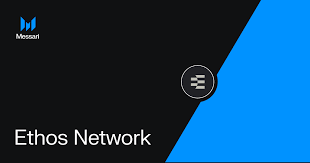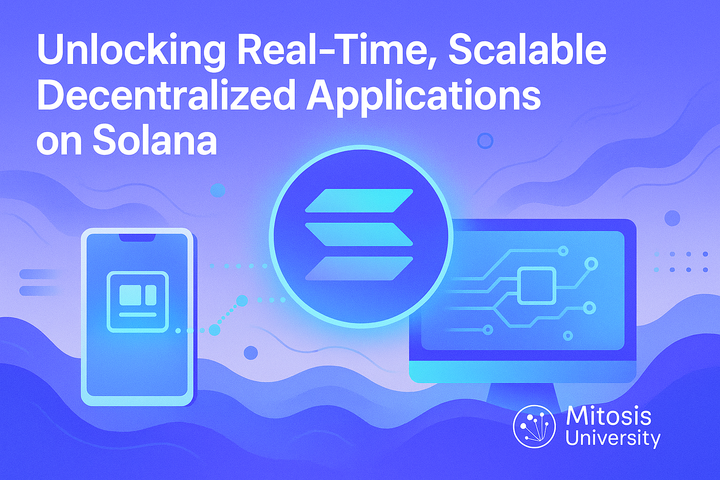Unveiling Ethos Network: Building Trust in the Wild West of Web3

The crypto and Web3 space, often likened to a "Wild West," faces a fundamental challenge. A severe lack of trust stemming from widespread fraud, scams, and misaligned financial incentives. This volatile environment highlights an urgent need for verifiable accountability. Ethos Network rises to this challenge by measuring and certifying credibility and reputation directly onchain. Bridging the gap with real world credibility systems, Ethos introduces a dynamic credibility score backed by a detailed onchain profile, akin to a decentralized credit report. By incentivizing ethical behavior through a novel social Proof of Stake mechanism, Ethos aims to foster a more trusted, transparent, and mature crypto economy where verifiable reputation is the future.
The Ethos Protocol: Core Mechanisms for On Chain Credibility
Ethos is not merely another decentralized application (dApp), it’s engineered as a foundational credibility platform, designed to be an integral part of the broader crypto infrastructure. This means it offers capabilities that extend beyond a single user experience, allowing existing interfaces like Chrome plugins and Metamask snaps, as well as various dApps, to integrate and build upon a shared foundation the Ethos protocol. The vision is to enable seamless, trust enhanced interactions across the Web3 ecosystem.
At the heart of the Ethos protocol lies a sophisticated set of interlocking mechanisms, purpose built to tackle the challenge of social validation in a decentralized world. These mechanisms collectively define what it means to be reputable and trusted on chain, and quantify how much one is trusted. By adapting and leveraging consensus principles similar to those Ethereum relies on today, Ethos generates a dynamic credibility score and incentivizes ethical behavior.
The core mechanisms driving the Ethos protocol include:
- Review: A standard rate and comment interface allowing users to build reputation beyond financial stakes.
- Vouch: The highest credibility signal, where participants stake Ethereum (or future assets) in others, signifying a deep level of trust.
- Slash: A critical deterrent, enabling the community to propose and confirm unethical actions, leading to financial penalties and reputation reduction for bad actors.
- Invite: A gatekeeping mechanism requiring new users to be invited by existing, credible profiles, fostering a sybil resistant network and creating credibility bonds between inviters and invitees.
- Attest: A means to link other social network profiles and digital identities to a single Ethos profile, consolidating one's online influence and preventing impersonation.
- Credibility Score: A single numerical value generated by interpreting the social interactions and on chain activities facilitated by the above mechanisms.
- Ethos Profile: A comprehensive hub showcasing the credibility score along with corroborating details, offering insights into one's allies, actions, and overall on chain reputation.
Together, these mechanisms form a robust framework for building and maintaining verifiable credibility, aiming to transform how trust is perceived and managed within the decentralized digital landscape.

The Vision and Necessity: Why Ethos Matters for Web3's Future
The transformative potential of the crypto economy can only be fully realized when every participant can readily ascertain each other's credibility. Ethos believes that a comprehensive score, encompassing an individual's vouches, reviews, and connections, will be sufficient to form a qualified understanding of their social signals. This fundamental shift will empower users to evaluate trust in every interaction, fostering a safer environment without compromising the benefits of pseudonymity. Ultimately, the entire Web3 space is poised for maturity when a meaningful amount of on chain credibility becomes an expected prerequisite for funding new projects, recognizing trusted voices, or exchanging goods for tokens. Ethos is actively building an extensible platform for this very Proof of Credibility.
"You are your actions": This quote underpins the core problem Ethos seeks to solve. The Web3 and crypto space currently suffer from a detachment between individuals and their long term reputation. While pseudonymity offers significant benefits, it has also enabled a culture where reputation can be easily discarded in favor of short term gains, contributing to the "Wild West" environment where trust is low and scams abound. Ethos aims to forge this crucial link, creating a future where participation in the crypto economy inherently requires a demonstrable track record of trustworthiness.
Consider these critical questions that highlight the current vacuum:
- How do you genuinely assess the legitimacy of a new coin, protocol, or dApp?
- What current methods do you employ to determine authenticity, and how do they compare to established systems in Web2 (e.g., TrustPilot, Yelp) or traditional finance (e.g., credit reports, Consumer Reports)?
- What would a robust, crypto native Web3 equivalent need to look like?
Ethos addresses these challenges by shaping a potential solution built upon several core tenets:
- A Legible Record: The platform will provide an at a glance profile that summarizes the most impactful events from a user's growing history of online behavior. Incentives are designed to encourage participants to review and vouch for positive actions, while a trusted community verifies whistleblower accusations. The Ethos credibility score concisely represents this comprehensive record.
- An Independent Profile: To ensure universal accessibility and verifiability, each Ethos profile exists as a foundational layer, independent of any single social network, application, protocol, or owner. This decentralized platform offers APIs, allowing other applications and sites to reference and build upon this shared source of credibility data.
- Inviting to Everyone: Ethos is designed for broad adoption, ensuring that everyone can join and thrive by building their reputation and wealth on chain. It accelerates both pursuits by rewarding participation regardless of financial stake, ensuring that funds cannot be used to "pay to win."
- Skin in the Game: Durable, long term credibility requires a delicate balance of financial and social incentives. Ethos is structured so that a strong reputation encourages investment, and genuine rewards from that investment, in turn, reinforce a positive reputation.
- Trustworthy Infrastructure: To sustain long term fairness, Ethos itself is engineered to avoid centralized ownership. Decentralized governance is a cornerstone of its protocol design and corporate structure, with deliberate choices made to limit outsized control, such as avoiding large venture capital investments and implementing strict maximum equity offerings for early angel investors.
Ultimately, Ethos envisions a future where checking credibility is universal. A lack of on chain reputation evidence will become a suspicious anomaly, driving the crypto market towards maturity where scams are rare and obvious.

Ethos Labs: Pioneering Ethical Profits and Credibility
At the helm of the Ethos Network is Ethos Labs, driven by a clear and impactful vision to increase ethical profits across the crypto economy. They believe in the principle of "a rising tide lifts all boats"that when goods and services can be exchanged reliably, everyone prospers. Unethical behavior, conversely, acts as a significant drain on markets, escalating risk, curtailing participation, and ultimately impoverishing the entire ecosystem.
With Ethos, the paradigm shifts, opportunities will naturally gravitate towards those with a long standing history of ethical conduct. Scammers, grifters, and unethical actors will find it progressively more expensive, risky, and time consuming to fake the signals of trustworthiness. Ethos Labs is committed to increasing investment in ethical behavior while simultaneously increasing the costs associated with unethical practices.
Their mission is unequivoca; crypto participation requires credibility. Echoing Bruce Schneier's sentiment that "Trust is essential for society to function," Ethos Labs aims to make the verification of credibility universal. In a future shaped by Ethos, a lack of demonstrable credibility will become a suspicious anomaly, driving the crypto market towards a maturity where scams are rare and obvious. Their ultimate goal is to make building and maintaining an on chain reputation so effortless and commonplace that it becomes an unquestioned standard for all participants.
Ethos Labs has set ambitious goals, measurable through tangible outcomes:
| Goal | Measurement |
|---|---|
| Align financial incentives to be backed by credibility, not rewarded by grift | Coins, funds, and projects leveraging Ethos raise above-average investment |
| Raise the bar of what credibility means in Web3 | % of top crypto influencers maintaining Ethos profiles |
| Increase overall crypto adoption by making it a safer place for new participants | % of new crypto participants connecting to Ethos |
| Save crypto billions in scams and rug pulls | Ethos participants exposed as grifters permanently lose credibility |
| Lead by example to demonstrate the power of ethical behavior | Phase governance from central control, to points, to decentralized governance. |
Core Mechanism Deep Dive: Reviews – The Foundation of Reputation
The Review mechanism within Ethos provides a fundamental and universally understood interface for conveying credibility opinions succinctly. Following a standard negative, neutral, and positive rating system, reviews offer both quantitative scores and qualitative commentary, making them intuitive to integrate into any context.
A critical aspect of Ethos reviews is their Sybil resistance. To leave a review, a user must possess a valid Ethos profile, which itself requires an invitation from an existing profile. This design significantly curtails spam and Sybil attacks, ensuring that feedback comes from authenticated, invested network participants. Furthermore, reviews are not anonymous, they explicitly include the identity of the reviewer, fostering accountability.
Reviews play a direct role in influencing the overall credibility score. The extent of their impact is dynamically adjusted by the credibility consensus, with factors such as:
- Reviewer Credibility: Reviews from highly credible users carry more weight.
- Reviewer Behavior: Reviews may be normalized to those who consistently leave only positive or only negative reviews might have less individual impact.
- Age and Volume: The freshness and quantity of reviews contribute to their influence.
- Network Proximity: Reviewers who vouch for you, or whom you vouch for, can exert greater influence.
This weighting system will be transparently documented through the Ethos Credibility Score.
Philosophy: Reviews are designed to be fast and free, serving as a weaker but earlier signal of reputation. They can provide an early warning sign or indicate a positive initial interaction. They offer a lightweight means to provide feedback, or even publicly denounce someone, before escalating to financially backed actions like vouching or slashing. Critically, reviews allow individuals to begin earning a reputation even before they accumulate substantial funds or build a large network.
Future Opportunity: While current Ethos reviews are on chain and linked to a profile, preventing anonymity, the future holds exciting possibilities. Ethos intends to eventually enable zkProofs (Zero Knowledge Proofs) for reviews. This would allow for anonymous feedback to be qualified by a "Credibility score range" for instance, "A highly credible person has negatively reviewed Bob." This innovation would allow for honest, uninhibited opinions while still distinguishing valuable signal from noise, addressing the fear of social repercussions that often silences true feelings.

Okay, let's continue with the detailed explanations of the other core Ethos mechanisms.
Core Mechanism Deep Dive: Vouch – The Pinnacle of Trust
The Vouch mechanism signifies the highest degree of trust within the Ethos Network. When participants "vouch," they stake Ethereum in an Ethos profile, a wallet address, or a social attestation. This fundamental act forms the bedrock of Ethos's trusted relationship network, directly representing the extent of an individual's support from allies and significantly impacting their credibility score.
Unlike simple reviews, vouching requires a backing asset, forcing participants to thoughtfully allocate their trust, both in terms of whom they vouch for and in what amounts. Ethos treats a single person vouching with 100Ξ equivalently to 100 people vouching with 1Ξ each, emphasizing that credibility is not merely a popularity contest. A single strong supporter can be far more impactful than numerous weaker ties. Crucially, while funds are staked in someone, the vouched individual does not have direct control over these assets. They cannot withdraw, spend, or reallocate the staked funds.
The impact on the credibility score from vouching is earned over time, not instantaneously. Currently, this credibility is earned over a 6 month bond period, encouraging sustained trust.
Mutual Respect is a magnified aspect of vouching. When two parties mutually vouch for each other, both their credibility and rewards are amplified. However, defecting from such a mutual stake carries a greater implication of untrustworthiness, reflecting a deeper breach of trust.
The mechanism is also complemented by Slashing, which provides a way to identify and punish unethical behavior through fines and reduced reputation. Users can also unvouch and withdraw their staked funds at any time. While vouch amounts cannot be modified without a full withdrawal, if a mutual vouch is unilaterally unvouched, the vouched party has 24 hours to mark it as "unhealthy," signaling poor terms to the network.
Philosophy: A long standing, mutually beneficial relationship is considered the single best indicator of trust. While proportional penalties exist for mistakes, explicit deceit and defection for financial gain are designed to incur strong financial disincentives. In extreme cases, where unethical behavior is sufficient to destroy one's reputation, all stakers will withdraw funds, leading to a drastic drop in credibility the social equivalent of bankruptcy. Given Ethos's pseudonymous nature, starting a new profile from scratch remains an option, though a costly one in terms of lost reputation.

Core Mechanism Deep Dive: Slash – Enforcing Accountability
The Slash mechanism is designed to impose financial penalties for unethical behavior. While not yet live in the Ethos Network and subject to parameter changes before launch, its core function is clear to maintain integrity.
In a process mirroring the whistleblower concept in Ethereum's Proof of Stake, any Ethos participant can act as a whistleblower to accuse another of inaccurate claims or unethical conduct. This accusation triggers a 24 hour lock on staking and withdrawals for the accused. The whistleblower then pledges a nominal reward to validators, who vote on the validity of the claims, receiving rewards regardless of their vote.
If validators confirm the unethical actions, the whistleblower's reward is reimbursed from the accused's staked amount this is the "slashing punishment," capped at 10% of their total Ethos stake. This is the only way staked funds can be withdrawn without the staker's explicit approval, intended for rare, egregious cases. The accused also receives a 72 hour grace period before being eligible for another slash.
Beyond financial penalties, Ethos also plans for "Social Slashings." Here, instead of risking capital, users risk their own social capital in the form of their credibility score. The process of voting and validation for such claims remains similar, emphasizing the power of community consensus in reputation management.
Core Mechanism Deep Dive: Invite – Building a Sybil Resistant Foundation
An invitation is a prerequisite for creating an Ethos profile, serving as a critical mechanism for ensuring a Sybil resistant network. Invitations create a direct bond between the inviter and the invitee's credibility score for the initial 90 days, effectively putting the inviter's social capital on the line.
How invitations work: An existing Ethos user can invite another Ethereum address via the protocol. Invitations are intentionally limited, with initial distribution managed by the Ethos Labs team. Invitations from highly credible users significantly boost the new user's starting score. Unaccepted invitations can be revoked.
The invitation bond: During the 90 day bonding period after an invitation is accepted, the inviter earns (or loses) 20% of their invitee's score. This creates both upside and downside, incentivizing careful selection. If an invited bad actor's score plummets, the inviter's credibility score will also decrease. This discourages self invitation or inviting untrustworthy individuals, while encouraging the invitation of credible, reputable people, as it mutually benefits both parties' credibility.
Core Mechanism Deep Dive: Attest – Verifying Identity and Influence
Attestation ensures that people are who they say they are by recording on chain other ways individuals represent themselves and their reputation online. This includes linking digital identities, social profiles, and wallet addresses, acting as a vital defense against fraud and impersonation.
Price and Costs: Attestation itself is free, requiring only the standard gas fees. However, lying about one's identity is the most expensive action on Ethos. Fraudulent attestation can trigger Social Validation and Slashing, resulting in significant costs to both reputation and staked Ethereum.
Mutually Exclusive: No two Ethos profiles can attest to the same external account or wallet. If an external account is already linked to another profile, the legitimate owner can automatically reclaim it without intervention, with this action recorded on chain. This provides evidence to "blow the whistle" on the fraudulent Ethos profile and trigger Social Validation.
Account Verification: Attesting external accounts requires demonstrating control over them, typically by emitting a specific message (e.g a tweet) or updating a profile page. Ethos plans to individually support various external accounts (Twitter, Facebook, GitHub, etc.), recognizing that this is not a blanket mechanism for all links.
Wallet Verification: Attesting a wallet involves signing a request, a process simplified by most wallet providers adhering to standard Ethereum specifications (EIP-712). Ethos intends to support wallets across multiple blockchains and allows a single Ethos profile to attest multiple wallets for enhanced security and consolidated representation of assets. Multi sig wallets require sufficient signing keys to sign the Ethos profile request. Ethos supports both custodial and non custodial wallets, and can accommodate hardware/air gapped wallets with specific signing procedures.
Pseudonymity and Permanence: There is no requirement for attestation to include real names; real names confer no advantage to the credibility score. However, attested accounts and wallets are permanently recorded on chain. Users maintaining separate pseudonyms for operational security or privacy must exercise caution, as a single slip up could permanently burn a pseudonym.
Proof of Humanity: Ethos explicitly does not require Proof of Humanity. Brands, clubs, governments, bots, AI, and any other sentient entities can develop and maintain a reputation independently of their biological underpinnings, reflecting the diverse nature of on chain participation.
Philosophy: Reputation is multifaceted and often community specific. Ethos aims to augment, not compete with, existing social applications. While public information exists, privacy is still respected; even if real names are used on different platforms, intertwining them is often undesirable. Pseudonymity fosters innovation by allowing experimentation and risk taking without "putting everything on the line." Ethos champions the benefits of pseudonymity while effectively mitigating its drawbacks.
Under the hood: Attestation utilizes an open schema independent of sole Ethos infrastructure. For account linking, an Ethos Oracle validates attestation links sends a signed transaction to the Ethos Smart Contract in an open format, and lists itself as a validator. For wallet linking, anyone can submit a signed attestation payload to the Ethos Smart Contract, with the Ethos Oracle providing convenience functions for signing via public wallet APIs.

The Ethos Profile: Your On Chain Credibility Hub
The Ethos Profile serves as the central aggregation point for all your on chain credibility evidence. This critical feature presents a comprehensive summary of relevant credibility cues, each representing activity from the Ethos protocol or linked wallets. It prominently highlights the most impactful elements, including high stakes vouches, high profile reviews, and significant financial holdings.
Beyond a mere summary, the profile acts as a dynamic launching pad, allowing users to drill down into specifics to answer questions beyond what can be summarized on a single page. From your Ethos Profile, you can ascertain your social circles, identify allies and adversaries, review major praises and gaffes, and track kept versus broken promises.
At the core of the profile is the Ethos Credibility Score, a single numerical value that attempts to synthesize a multitude of financial and reputational elements. Similar to how a traditional credit report culminates in a credit score, this metric provides an "at a glance" estimate of one's trustworthiness. Crucially, recognizing that this calculation impacts livelihoods and depends on evolving social norms, the algorithm itself is determined by the Credibility Consensus, ensuring community driven oversight.
From a technical standpoint, the Ethos Profile itself is stateless, retrieving all data directly from the blockchain and facilitating transactions with the Ethos Smart Contract. This design ensures that anyone can offer alternative profiles or applications that retrieve Ethos protocol data, promoting an open platform where credibility data can be interpreted in numerous useful ways. The ultimate vision is for other dApps to contextually reference elements of the profile, ideally without requiring users to navigate to a separate profile page. While the profile is stateless, Ethos's off chain infrastructure maintains a cache for swift page loads.
The Ethos Credibility Score: Quantifying Trust
The Credibility Score is the numerical quantification of trustworthiness within the Ethos Network. Its algorithm meticulously factors in a variety of weighted indicators, drawing exclusively from on chain Ethos protocol data. Key indicators include:
- Vouching Dynamics: The number of vouches received, the presence of mutual vouches, and the total amount vouched.
- Vouch Duration and Defection: The longevity of mutual vouches and instances of defection from them.
- Credibility of Interactions: The credibility scores of individuals who have vouched for or reviewed you.
- Contribution Quality: The average rating of your contributions on Ethos.
- Attestation Age: The age of attested accounts.
These weights are flexible and do not need to be linear; for instance, 100 positive reviews might contribute disproportionately more credibility than 10. Indicators and their weights can be dynamically added, removed, or adjusted, reflecting the collective decision of the Credibility Consensus.
The credibility score currently ranges from 0 to 2800, segmented into five distinct levels:
- 0-799: Untrusted
- 800-1199: Questionable
- 1200-1599: Neutral (All new wallets and attestations start at this default score)
- 1600-1999: Reputable
- 2000-2800: Exemplary
While the Ethos Credibility Score offers a quick, at a glance estimate across many domains, it acknowledges that no single number can fully capture the complexities of one's reputation across diverse groups and interactions. Different communities may warrant additional weights and calculations, and the Ethos open protocol is designed to allow other dApps to define alternative credit scores using the same underlying on chain records.
The calculation itself is transparent: it uses only on chain Ethos protocol data, and the algorithm will be committed to the Ethos Smart Contract, making all details publicly verifiable.

Conclusion: Forging a More Trustworthy Web3 Future
The journey through the decentralized landscape has, to date, been marred by a fundamental flaw, a deficit of verifiable trust. In the absence of legible, on chain credibility, the crypto and Web3 space has struggled with pervasive fraud, misaligned incentives, and an environment where reputation could be easily shed. The "Wild West" era, characterized by its financial risks and moral costs, has underscored an urgent need for foundational solutions that prioritize accountability.
Ethos Network emerges as that critical solution, meticulously designed to imbue the digital realm with the very essence of human trust and reputation. Through its innovative Proof of Credibility platform, powered by a robust suite of mechanisms—from the foundational Review and high stakes Vouching, to the protective Slash and Sybil resistant Invite, and the identity affirming Attest Ethos constructs a comprehensive, on chain credibility profile for every participant. This culminates in a transparent, community governed Credibility Score, enabling "at a glance" trust assessment without sacrificing the benefits of pseudonymity.
Ethos is more than just a scoring system, it’s a commitment to fostering ethical profits and universal participation. By making reputation an undeniable on chain asset, it channels opportunities towards ethical actors and significantly raises the barriers for bad actors. The vision of Ethos Labs is clear: to cultivate a mature crypto economy where checking credibility is as commonplace and effortless as it is in traditional society, where scams become rare aberrations, and where trustworthiness becomes the expected standard.
In the not so distant future, as the Web3 space evolves, the presence of an Ethos profile will not just be a preference, but a fundamental expectation. Ethos Network is laying the groundwork for a digital frontier where your on chain actions truly define who you are, ushering in an era of unprecedented trust and accountability for all.
I hope Mitosis partners with Ethos network because they are producing a good quality sybil resistance project that can help out in Mitosis. Also u can check out Mitosis EOL and Matrix in the links here!



Comments ()